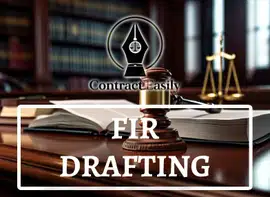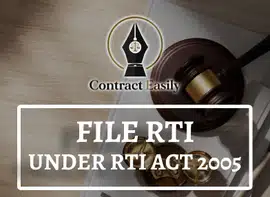A legal notice is a document that is issued by a lawyer to a person (legal or natural) on the orders of his client, and through this document, the opposite party is notified of the intention of the party giving the notice.

Send a Legal Notice
What is a legal notice in India – a formal letter you can send if you're dealing with a problem and want to seek justice in court. This document is like a serious conversation starter, letting the other party know about the issue and your plan to take legal action if things don't get resolved.
When your rights are compromised, start by sending a legal notice to the other party. It's like explaining the issue with all the details, facts, and why you think you're legally in the right. These notices are usually put together by legal experts who understand the laws related to your situation.
Why send a legal notice? Firstly, it's an official way to tell the other party what you're claiming or demanding. By sending this notice, you're showing them you're serious about solving the problem using the law. Plus, it leaves a record, so if things don't work out, you have proof that you tried to resolve the issue before taking legal action.
Here are some common legal scenarios in India where sending legal notices is helpful, along with relevant legal sections:
Property Disputes:
Description: Property disputes can arise concerning ownership, boundaries, or other related matters. Sending a legal notice can be the first step in resolving these issues amicably.
Applicable Sections: Sections of the Transfer of Property Act, 1882, Specific Relief Act, 1963, and relevant state-specific property laws.
Consumer Complaints:
Description: Consumers facing issues with goods or services can use legal notices to communicate grievances, demand resolution, and protect their rights.
Applicable Sections: Consumer Protection Act, 2019, and specific sections based on the nature of the complaint.
Employment Disputes:
Description: In cases of wrongful termination, non-payment of dues, or harassment at the workplace, sending a legal notice can be the initial step before taking legal action.
Applicable Sections: Sections of the Industrial Disputes Act, 1947, and relevant labor laws.
Contractual Disputes:
Description: When there's a breach of contract, a legal notice outlines the breach, demands compliance, and can serve as a precursor to legal action.
Applicable Sections: Indian Contract Act, 1872 (various sections related to breach of contract).
Defamation Cases:
Description: If false statements harm your reputation, a legal notice can be sent to demand an apology or retraction before considering a defamation lawsuit.
Applicable Sections: Sections 499 and 500 of the Indian Penal Code (IPC) deal with defamation.
Family Disputes:
Description: Legal notices in family matters (divorce, child custody, property division) signal an intent to address issues through legal means and may precede negotiation or mediation.
Applicable Sections: Sections of the Hindu Marriage Act, 1955, or other personal laws governing marriage and family matters.
Debt Recovery:
Description: In cases of unpaid debts, sending a legal notice can be a formal way to demand payment before pursuing legal avenues for debt recovery.
Applicable Sections: Section 138 of the Negotiable Instruments Act, 1881, deals specifically with the dishonor of a cheque.
Cheque Bounce:
Description: A legal notice for a bounced cheque can be sent to the drawer, demanding payment as per the provisions of the Negotiable Instruments Act.
Applicable Sections: Section 138 of the Negotiable Instruments Act, 1881, addresses the offense of dishonor of a cheque for insufficiency of funds or exceeding the amount arranged to be paid.
It's essential to consult with a legal professional to determine the appropriateness of sending a legal notice in a specific situation and to ensure that it adheres to the relevant laws and regulations.
Legal notice is merely a formal expression of one's intention of taking a legal action against the other party.
Documentation is required.
- The receiver of the notice's name, description, and address.
- Facts and grievances that are clear and understandable, condensed to writing.
- Relief or action sought, in writing.
- The cause of the action is stated.
- Signed and confirmed by a licenced attorney
No but The legal notice differs from other deeds or registrable documents, as it is specifically crafted by addressing pertinent points that vary case by case. In the context of matters in India, legal notices are tailored to the specific circumstances of the issue at hand. These notices serve various purposes across distinct fields, such as resolving employer-employee disputes, addressing matters related to domestic violence and divorce, and handling cases involving the bouncing of 138 Cheques. Therefore, the content and structure of a legal notice are adapted according to the nature and requirements of the legal situation it is intended to address.
Yes, it's important to send the legal notice directly to the person it's meant for. This is part of a formal communication process. The communication is considered complete when the other party responds, whether they act on it or against it and is a valid ground for communication in court. Ignoring the notice is still considered part of the communication. It's crucial to keep the receipt for future use, especially if a friendly resolution isn't reached, and legal action becomes necessary. Sending the legal notice also makes the sender's intentions clear.



Category: Legal Disputes
3415